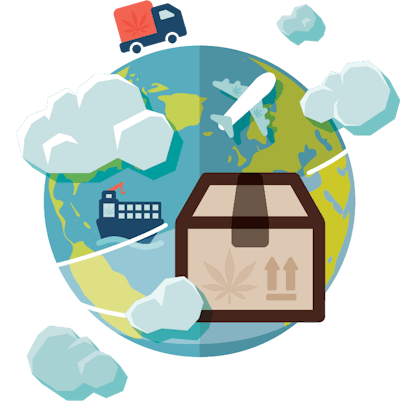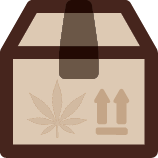
On Feb. 1, Tilray, a Canadian-licensed medical cannabis producer (LP), announced that the company had just finalized a deal allowing it to export medical marijuana to Chile.
The move increases the company’s market cap by an estimated 88,000 potential patients, according to a press release from Tilray, with distribution within the country being handled by a Chilean partner, Alef Biotechnology SpA.
“[This] announcement marks Tilray’s entry into Latin America and expands our international reach to a fourth continent,” said Tilray President Brendan Kennedy in the release.
This is not the first international cannabis export deal of its kind. Canadian LPs have been making headlines for months with announcements of new medical marijuana export deals: Canopy Growth Corp. announced export deals with Germany and Brazil in the latter half of 2016, and Tilray also has export deals with Croatia, Australia and New Zealand.
American growers have been shut out from those international markets, however. Due to the plant’s illegal status at the federal level, cultivators cannot cross state lines with medical marijuana, let alone international borders. Without federal oversight from U.S. authorities, international cannabis deals remain out of reach for U.S. cultivators.
“The federal government would need to provide an exception [from prohibition] for medical marijuana in order to export medical marijuana,” says Mel Simburg, a lawyer specializing in international transactions at the law firm of Simburg, Ketter, Sheppard, & Purdy in Seattle.
Changing federal regulations, however, is just the first step in a complicated process.

Complexities of International Treaties
Import/export deals are complex agreements requiring the involvement and oversight by both the importer’s and exporter’s governments, and such deals are tightly controlled. Health Canada, the national health authority that regulates the Canadian medical marijuana market, controls all medical marijuana exports.
“Export is only permitted in very limited circumstances, such as for scientific research or medical purposes, and where Health Canada is satisfied that there are no health or public safety concerns,” the agency said in a statement to Cannabis Business Times.
LPs looking to acquire an export permit are evaluated by the regulatory agency to determine if:
- the application is consistent with the relevant provisions in the Access to Cannabis for Medical Purposes Regulations (ACMPR) and the Narcotics Control Regulation (NCR);
- the country of final destination has issued an import permit;
- there are any risks to public safety and security, including the risks of diversion; and
- whether the Canadian government would be in violation of any international drug treaties.
Cannabis is an internationally controlled substance as defined in the Single Convention on Narcotic Drugs of 1961, as amended by the 1972 Protocol, the Convention on Psychotropic Substances of 1971 and the United Nations Convention Against Illicit Traffic in Narcotic Drugs and Psychotropic Substances of 1988. Its production is controlled, to some degree, by the International Narcotics Control Board (INCB), which releases yearly estimates of each country’s narcotic requirements.
“The totals of the estimates enable parties to determine the maximum quantity of drugs that a State may acquire under the 1961 Convention through import and/or manufacture,” the organization says on its website (bit.ly/incb-narcotic-estimate).
For example, Chile’s estimated required amount of cannabis needed for 2017 is 9,600 grams (roughly 21 pounds), meaning that, according to the INCB, Chile should only be manufacturing or importing 9,600 grams of cannabis in 2017. In contrast, Canada’s required amount is approximately 67.3 million grams, and Germany’s is 1.5 million grams.
While the INCB oversees the global traffic of legal narcotics, countries that signed on to the 1961 Convention enforce the agreements on themselves. However, Health Canada has not been enforcing this particular treaty.
Money Matters
According to articles 23 and 28 of the 1961 Convention (bit.ly/1961-convention), governments that allow the cultivation of any controlled narcotic are required to “purchase and take physical possession of such crops as soon as possible, but not later than four months after the end of the harvest” and “have the exclusive right of importing, exporting, wholesale trading and maintaining stocks other than those held by manufacturers.”
“So, the question is whether those Canadian companies have a license from a national government agency to export or import,” says Tom Blickman, a program coordinator at the Transnational Institute's Drugs & Democracy Programme. “But even that might not be the legal way, as this [is] reserved for the agency itself. As far as I know, only the Dutch medical cannabis arrangement is according to the provisions of the 1961 UN Single Convention.”
By granting export licenses and giving away its exclusive right of controlling cannabis exports, Health Canada appears to be in violation of international treaties, though that isn’t keeping Canadian LPs from introducing themselves to international markets. (Health Canada did not comment on this particular issue.)
Global markets represent important expansion opportunities for cannabis businesses, according to Jordan Sinclair, director of communications at Canopy Growth Corp.
Sinclair says Canada’s robust regulations has allowed Canopy Growth Corp. to “get into these markets early.”
However, the company's “long-term plan is to build similar businesses in the other jurisdictions as the law allows,” he says. “Exports play an introductory role. You’ll see emerging markets can be serviced with export, but I think the majority … will [eventually] be satisfied with domestic production.”
For now, Canadian LPs have a head start in introducing their wares to new markets. In its statement, Tilray reported it would be sending its first shipment of medical marijuana to Chile's capital, Santiago, by the end of February. American growers, for their part, remain confined by state borders.














